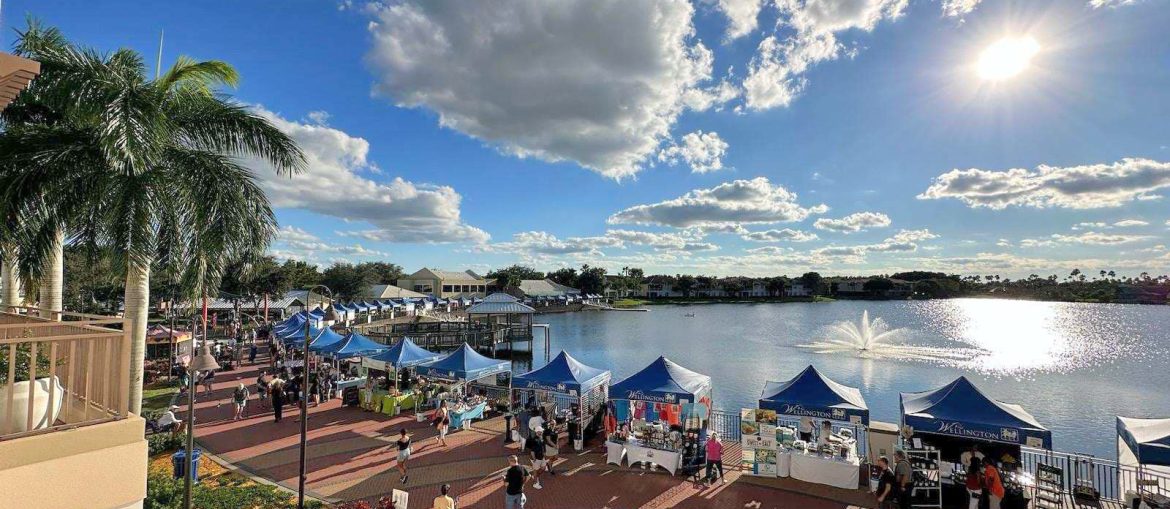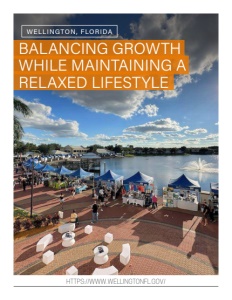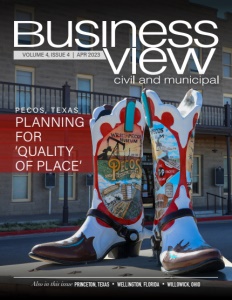Wellington, Florida
balancing growth while maintaining a relaxed lifestyle
Realizing its plan, Wellington, Florida lays the framework for a bright economic future
In 1953, the State of Florida drained thousands of acres of swampland located just west of the City of West Palm Beach in Palm Beach County. With adequate flood and stormwater control, the swampy area eventually became suitable for agriculture, and portions of the newly fertile farmland were sold off for cultivation. One of the properties, known as the Flying Cow Ranch, was owned by Charles Oliver Wellington, a Harvard-educated accountant from Massachusetts, as well as a successful investor, aviator, and sportsman. At one time, a portion of the original Ranch property was home to the world’s largest strawberry patch.
In 1972, the Village of Wellington was approved for development, after Roger Wellington, Charles’ son, sold some 7,200 acres to developer Jim Nall of Fort Lauderdale. The 150-acre Lake Wellington was developed and a golf course, a country club, and residential neighborhoods were constructed. In 1980, the population of Wellington was 4,622. “We started out as a master-planned community development in an unincorporated area of the county,” explains Village Manager, Jim Barnes. “The draw for most who originally moved to Wellington was the typical suburban draw – larger lots, good schools, and good amenities. And we evolved over time.”
On December 31, 1995, Wellington was officially born as an independent municipality and its evolution blossomed.. Over the last three decades, its population increased from 28,000 to more than 61,000 people living within its 45-square-mile footprint, of which 20 percent is reserved as a stormwater treatment area. Today, Wellington continues to be a highly attractive suburban community, once named by Money Magazine as a “Best Place to Live.” “What makes it a great place to live and thrive boils down to families,” says Barnes. “We remain a bedroom community made up of great neighborhoods, with great amenities, including best-in-class parks and recreation, facilities, and great schools.”
What makes Wellington even more special is its designation as a major center of equestrian show events — jumping, hunting, and dressage – as well as for hosting several international polo tournaments every year; establishing it as “The Winter Equestrian Capital of the World”. The Winter Equestrian Festival, held from January to April, is the largest and longest-running circuit in horse competitions, with competitors from 50 states and 30 countries. And recently, the United States Polo Association established its headquarters and its main seasonal polo venue in Wellington. “Both those groups continue to be partners in the community and economic drivers in that four-to-five month window that attracts a lot of the non-residents that are here,” Barnes says.
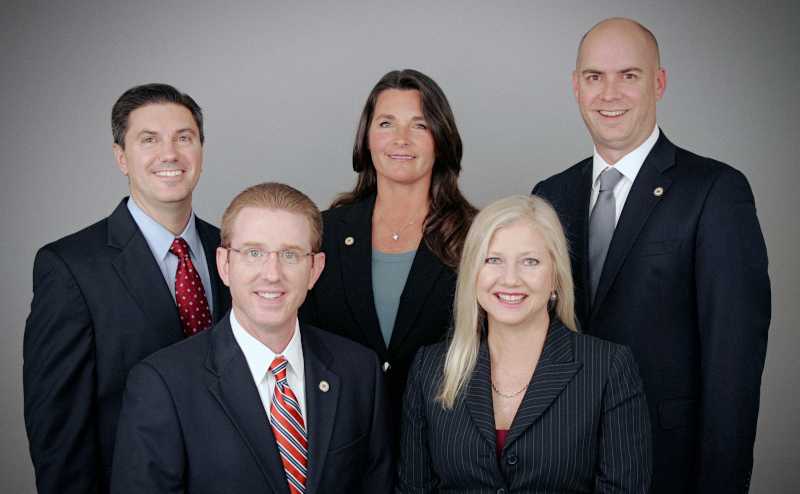
Council
A more recently emerging economic driver in Wellington is its position as a medical hub with three close-by hospitals in the region providing services to the greater community: Wellington Medical Center, which is within the Village boundaries, plus Bethesda Hospital to the south and Palms West Hospital to the north. Available office space in the Village continues to be filled with medical-related practices and businesses.
That being said, Barnes notes that many of Wellington’s non-seasonal and non-medical businesses are small and home-based — both professional and service-related. “And that predated COVID and the whole trend of remote work,” he states. When COVID finally did hit Florida in 2020, “Wellington was already well-positioned, having committed a lot of resources to technology, so we were able to continue serving the community rather seamlessly,” he adds. “We recognized the importance of telecommunications as part of the community’s infrastructure, even more so because of COVID and the demands we had for our residents and our kids doing virtual schooling.”
“But, we’ve also seen the need to improve on that infrastructure and we’ve been taking a three-pronged approach,” he continues. “One is actively contacting the major telecommunications carriers we have in the community and talking about what they have in their plans and how we can help support that and/or speed it up. Another is to look at our regulations as they relate to telecommunication facilities and see how we can streamline them and bring them into today’s demands. Many of our rules regarding cell towers and similar infrastructure were written at a time when maybe only every other person had a cell phone; now each individual has two or three wireless devices and kids as young as six to eight have their own phones, whereas that was unheard of ten years ago.
“The third approach: we’ve looked at where the major infrastructure, the towers in particular, are, and we’ve identified some of our own properties where we think towers might be conceivable. We’re working with Arcadia Towers out of Cleveland, Ohio to market those to the telecommunication carriers to see if they have an interest in enhancing the service that we have. We do know we have certain areas that have either poor coverage or almost no coverage.
So, it’s not only a quality of life issue, but a public safety one, as well.”
Another ongoing initiative in Wellington is the Town Center Project, a years-long redevelopment, originally created as a gathering place that houses the Village Hall, a community center, an amphitheater, a playground, and an aquatics complex located on the south end of Lake Wellington. “Recent investments have included adding a boardwalk – a promenade along the lakefront which has enhanced our community events and offerings, which include a lakeside market, concerts and movies, an annual craft beer fair, and a bourbon and bacon fest,” Barnes reveals.
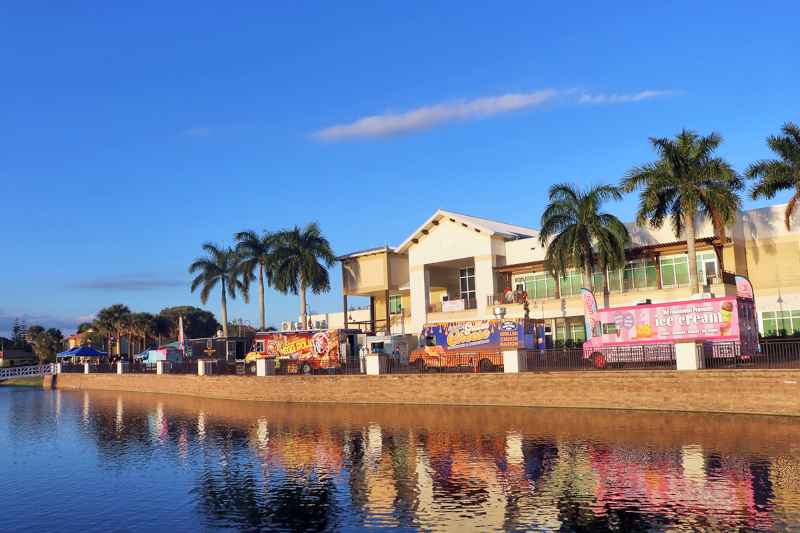
“We have another phase where we’re expanding the green area of the amphitheater to accommodate larger crowds,” he adds. “We’re also looking to make changes to the southwest of the property where we currently have our aquatic center. This site was a country club in the original layout with a pool and community center and now we’re trying to transition that into a larger community gathering space. The Village Council has decided that the aquatic center will move elsewhere to open this up to become more of a gathering place. We used to have tennis courts and those were redeveloped on another site. We’ve seen that new site bustling and looking to expand into the world of pickleball.”
Tim Stillings is Wellington’s Planning, Zoning, and Building Director. He agrees that because Wellington is relatively built out, much of his focus relies on infill, redevelopment, and repurposing existing properties, such as converting former golf courses into homes and neighborhoods.
“We’ve been talking to the owners of the Mall at Wellington Green to look at ensuring that that site continues to be viable into the future. It’s been struggling over the last few years. We’re seeing a continual decline in its appraised value, but it’s a significant piece of property – 97 acres. We’ve been talking about ways we can infill some portions of the surrounding parking area to make sure the long term of that site remains an important asset to the community.”
Barnes admits that while “progress is great, change can be difficult for many people. So, it’s important to look at our limited redevelopment opportunities very closely and continue to provide what’s good for the community as a whole. Trying to make positive, forward progress and adjustments are important, but you’ve got to do that without negatively impacting your existing residents and your existing businesses. It’s a balancing act. So, it’s critical to continue to engage with all our residents and visitors and get their input and their recommendations so that our elected officials are able to make informed decisions that benefit the entire community.”
Barnes maintains that one of Wellington’s core and lasting principles is sustainability. “From an environmental standpoint, we have a commitment to the preservation of open space and recreational amenities,” he states. “We have different infrastructure improvements that we’ve made that double as environmental locations.” Indeed, over the years, the Village has spent millions on stormwater management, while simultaneously creating its own internal stormwater treatment system, the Wellington Environmental Preserve at the Marjory Stoneman Douglas
Everglades Habitat, a 365-acre rainwater storage area with miles of trails, and acres of wetland areas “teeming with flora and fauna,” according to Barnes. “In addition, all of our newer municipal facilities have either achieved or have been designed to meet LEED certification standards, with building technologies that provide for greater efficiency and reduced energy consumption. And our fleet has alternative fuel supplies.”
Barnes believes that Wellington needs to continue to promote smart and sustainable growth in order to stay relevant and competitive as communities around it also continue to develop. “We want to continue to be a community of choice for folks in Palm Beach County and South Florida, but maintain the appeal that brought people out here, to begin with, which is great neighborhoods, great schools, great parks, and a high level of service,” he says in conclusion. “You want to keep all the great things that brought people out here, to begin with.”
AT A GLANCE
Wellington, Florida
What: Charming town with impressive growth and modern amenities
Where: Palm Beach County, Florida
Website: https://www.wellingtonfl.gov/
